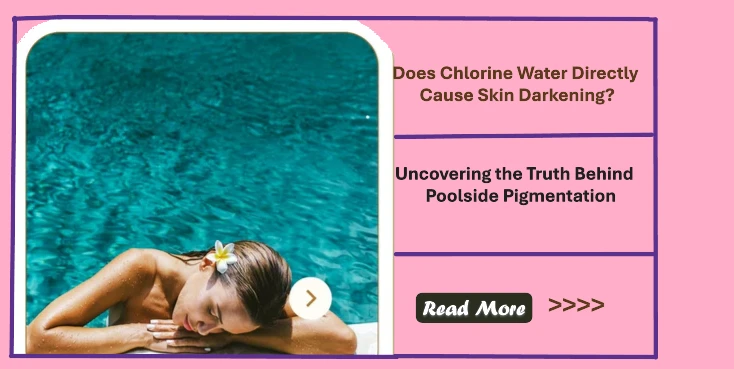Does Chlorine Water Directly Cause Skin Darkening? Uncovering the Truth Behind Poolside Pigmentation
Does Chlorine Water Directly Cause Skin Darkening? Uncovering the Truth Behind Poolside Pigmentation
Chlorine is a widely used chemical in swimming pools to disinfect water and eliminate harmful bacteria. While it serves an important role in maintaining hygiene, many people wonder whether frequent exposure to chlorinated water can cause skin darkening. The answer isn’t entirely straightforward—chlorine itself may not directly darken the skin, but it can contribute to factors that lead to a darker, duller complexion over time.
Does Chlorine Cause Skin Darkening Directly?
Chlorine does not directly deposit pigment into the skin or stimulate melanin production (the pigment responsible for skin color). However, the indirect effects of chlorine exposure may cause your skin to appear darker, especially with repeated or prolonged contact.
How Chlorine May Contribute to Skin Darkening
-
Skin Dryness and Barrier Disruption
Chlorine strips away the skin's natural oils, leading to dryness, rough texture, and irritation. Dry, dehydrated skin can appear dull and uneven, which may be mistaken for darkening. In people with sensitive skin, this irritation can trigger post-inflammatory hyperpigmentation (PIH)—dark patches that develop after skin inflammation or damage. -
Increased Sun Sensitivity
Chlorinated water can make the skin more sensitive to UV rays, especially if swimming outdoors. This increased sensitivity can accelerate sun tanning or sunburn, both of which can lead to temporary or long-term skin darkening. Without proper sun protection, chlorine combined with sun exposure can intensify pigmentation issues. -
Accumulation of Residues
Over time, chemical residues from chlorine and other pool disinfectants may not be fully rinsed off, especially if a person does not shower immediately after swimming. These residues can interact with natural sweat and oils, leading to a build-up that gives the skin a darker or uneven appearance, particularly in creased areas like the neck or underarms. -
Chlorine Allergies or Reactions
In rare cases, individuals may experience allergic reactions or sensitivity to chlorine. This can cause rashes, redness, or skin inflammation, which again may result in hyperpigmentation after healing.
Who Is More at Risk?
-
People with darker skin tones, who are naturally more prone to hyperpigmentation
-
Individuals with dry or sensitive skin
-
Swimmers with long-term or daily exposure to chlorinated water
-
Those who do not follow proper post-swimming skincare routines
How to Protect Your Skin from Chlorine-Related Effects
-
Apply a barrier cream or oil before swimming to protect the skin
-
Rinse off immediately after swimming with fresh water
-
Use a gentle, non-stripping cleanser and follow up with a rich moisturizer
-
Apply sunscreen before outdoor swimming to prevent UV-induced darkening
-
Exfoliate weekly to remove dead skin buildup and restore brightness
Conclusion
While chlorine water does not directly cause skin darkening, it can lead to dryness, irritation, and increased UV sensitivity—factors that may result in a darker, duller complexion over time. By taking preventive measures and maintaining a consistent skincare routine, you can enjoy swimming without compromising your skin’s natural glow.

Related Blog
What Causes Oily Skin and Can It Be Managed Naturally? Exploring Root Causes and Gentle Solutions
Aug 2, 2025 by Admin
General
What Are the Signs That You Have Sensitive Skin? Key Symptoms to Help You Identify This Delicate Skin Type
Aug 1, 2025 by Admin
General